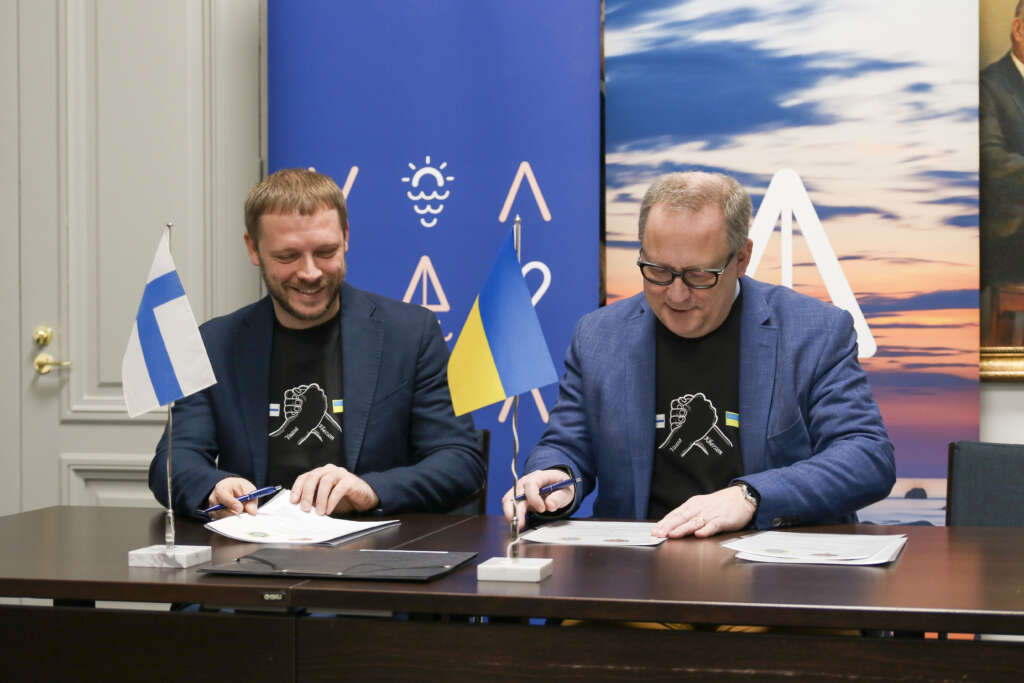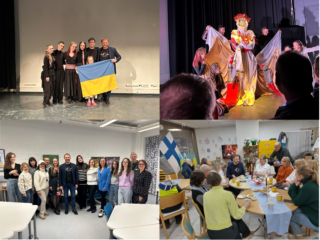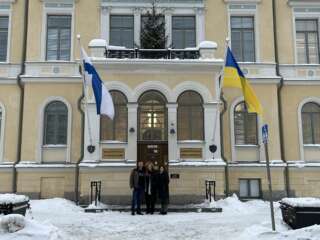
Article categories: Archive News
Build Back Better Together
Published: 20.12.2023
On 13-15 December 2023, Deputy Mayor of Kherson Mr Vitalii Bielobrov visited Finland and Vaasa for the first time. The visit served the conclusion of a deepening friendship and solidarity between Kherson and Vaasa, which is now enshrined in a new Cooperation Agreement, making Kherson Vaasa’s eleventh Sister City.
The agreement establishes four focus areas, which the cities want to undertake together. The first, sustainable development, includes issues such as circular economy, energy, and clean water. The second focuses on youth, education, and science with the goal of establishing school and university exchanges and teacher trainings. The third area of culture and sports serves the conducting of common activities, hence creating a contact platform for civil society. Lastly, city administration and democracy aim to take place at all levels of government from the political and mayoral level to the knowledge exchange between staff.
The Youth is the Future
For Bielobrov it is important to start the “Building Back Better” work already today. “If we wait, we will lose important time. We need to begin now and have plans ready.” The hero city Kherson wants to be a city for young people, creativity, and eco-business – a centre for tourism, creation, and culture. For this, Bielobrov says, young people and their creativity is needed. He hopes many will return and believes the partnership is a meaningful sign for the future. “It is important to show people that we believe in the future, that we are doing everything already for building a better future, and that we have partners to support us”
Finland is well-known for its education system. Bielobrov met with several groups of Ukrainians and even people from Kherson already living in the Vaasa region. They all emphasised how great the Finnish education system is by, e.g., keeping a close and open dialogue between the school and home, providing schoolchildren with free books and a warm lunch, and that Ukraine can learn from Finland’s system. At a visit to Vaasa’s vocational school Vamia, Bielobrov highlighted that especially those people, who can work with their hands will be needed after the war. He also met other Ukrainians, who are very grateful to Vaasa and the entire Vaasa region for the integration of people in need. While he hopes that many will return to Ukraine and take their knowledge back with them, he also noted that there needs to be a system in place for those, who decide to stay in Finland.
Currently, there is not one educational institution that has not been partly or totally destroyed. But Kherson is already planning for the future as the city plans to build 20 daycares, 10 schools, 5 colleges, and 2 modern and interesting universities.

Culture Can Give Us Hope and a Memory of Home
During his visit, Bielobrov got to see a performance by the Ukrainian theatre group Kalambur. Titled “Because it is my home”, Ukrainian students who are currently living in Finland, shared their own and Ukraine’s story with the audience. The very professional and emotional performance showed the importance of culture and how it can give us a way of dealing with what has and is happening.
Kherson is currently planning to build a new museum, a “Museum of Resistance”. For this, the bureaucratic and preparatory process needs to start as early as possible. They also need to recover the artefacts, books, and documents, which have disappeared.
Rebuilding Sustainably
Bielobrov hopes that Kherson can learn a lot from Vaasa’s Energy Cluster. Kherson wants to build back much of its infrastructure, residential areas, and business parks in a sustainable way and sees Vaasa and EnergyVaasa as a partner in this. The goal is to make Kherson a good ecosystem for investments, to decentralise and open up the market, and to ensure that the competence needed, comes to Kherson.
A Resilient Democracy and Administration
“We went back 20 years as the result of destruction of documents and document infrastructure.” While it won’t be possible to recover everything, Kherson hopes to build a better and more resilient system for the future. For this, they want to learn from the City of Vaasa and its electronic case management systems.
Rebuilding the city also needs to happen close to the people. A society needs to be created that fosters trust and community. Elections and participation play an important role in this. To ensure high voter turnout, Vaasa and Finland offers, e.g., many physical voting places, pre-voting, and support for disabled people to vote from home. Additionally, there are multiple levels on which citizens can participate in decision-making in Finland. It is important to learn democratic values from an early age and Vaasa’s schools do so by teaching democratic principles integrated in several subjects, organising elections for Vaasa’s Youth Council, and ensuring the representation of students’ interests in Student Unions, who also have an own budget. Free and equal education are important for building a strong society.
“I hope that all of us will come out of this stronger”
For Bielobrov, it was a valuable experience to meet with representatives of the City face-to-face and to start building future relations, connections, and friendships. For Vaasa’s Mayor Tomas Häyry, Vaasa has a lot to give to Kherson. “But we also have a lot to learn. For example, if we look at how resilient the community is in Kherson today and think about how they are coping with the terrible ordeal they are going through, there is much we have to learn considering preparedness.”

